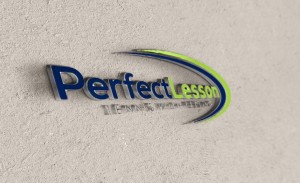
Case Study
Aiden Sexton 1 June 2017
ATTITUDE
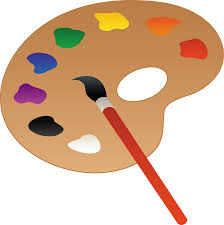
Attitudes are the Mind’s Paintbrush
Attitude…..what a lovely word. But what does it really mean ? And how do you know if you have the correct attitude or not ?
And if not, how do you go about changing it ?
Let me tell you a story about Aiden ……I think it will help you understand more about this mercurial item, attitude.
Aiden recently played a TA JDS tournament in Cairns, Australia. He played in the 15U Boy’s Singles. Previously Aiden had not had the correct attitude, but still believed he could go places, he could get there. He is tall and a big hitter …. (NB always beware of the term big hitter ). However in the past he practiced incorrectly and in matches tended to hit two winners for every five errors. (Losing tennis obviously). As well he was mentally fragile, constantly oscillating between hot and cold results and even hot and cold moments.
So that gives you a brief insight into Aiden’s old attitude.
In the recent tournament Aiden was down to play four matches in his group. The number one seed for the whole event was also in Aiden’s group.
Aiden’s first match was against an experienced tournament player who plays left handed. I warned Aiden that his first opponent was quite a good player and would not be giving Aiden any free points and that if Aiden were to win he would have to play perfectly.
Aiden lost 2-4, 2-4 under the Fast Four format.
After the match Aiden’s father who was watching the match said that Aiden stormed off the court saying things like “ this is hopeless…..I hate tennis…….I give up…..I am not playing again etc, etc”.
So I thought to myself “well I knew there was a good chance that this would happen “. (The loss, the playing badly and the negative attitude.) Some time later I told Aiden I needed to talk to him; did he want to talk now or in 15 minutes. He chose now.
Luckily we could find a private table at the club so the three of us sat down. I started off by saying “one of the great things about tennis is that the scoreboard never lies !! “ I continued by asking Aiden “who was the better player in that match ?” I know he wanted to say that he was definitely the better player but somehow, mysteriously he lost to a weaker player. However eventually he did agree that the other player was the better player.
And here we have one of the first spin offs from a wrong attitude ……false expectations. Aiden firmly believed that he was going to win that match ……but hang on. Had he been practicing perfectly ? Had he been working on improving his attitude ? No ! Aiden thought he was going to win because he was the better hitter, the better Beach Bat player. Totally false expectations.

By the way Beach Bat matches are played all the time in summer on the beaches. Note well, no baselines, no sidelines and no net. Who will win ? The best athlete and possibly the person who can hit the hardest. This game is most definitely nothing like the Real Game of Tennis. Aiden was loving this type of game.
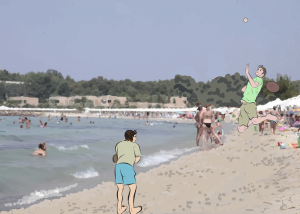
So Aiden thought…..(expected !!) ……..he would win by using Beach Bat tactics. Unfortunately the Beach Bat Champion will never beat even an average level tennis player if this opponent knows the Real Game of Tennis.
So the conversation moved on and Aiden put forward the question “can I still win the tournament ? “ (Note well, this thought also includes the trophy, name in the paper etc ).
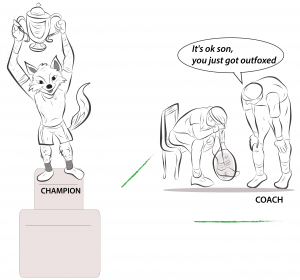
I was actually a little taken aback, not expecting this question (silly me).I told him that he was to stop thinking about trophies and winning tournaments and even matches. He needed to focus on the items he was weak at. He needed to understand the correct programme which was to break his whole journey down into little steps and for him to have the faith that by improving those items he would improve his overall tennis level. He needed to earn the right to start winning matches. He needed to believe that by paying attention to detail and by gradually improving his tennis skills only then would he win more matches and eventually trophies and all the glory that goes with being the champion.
He could achieve this only if he adopted the correct attitude, not only in match play but in all other aspects and areas of the game of tennis.
Including the willingness to learn and take constructive criticism; to listen to his coach, to look at himself and finally to learn from all of his losses.
The former coach of the NY Giants NFL football team wrote an excellent book on this subject. In it he emphasised the importance of having a Superior Preparation. From 2007 Tom went on to lead his team to two Super Bowls.

So in this conversation I told Aiden that he has two choices. He can stay as he is (Beach Bat Champion), or he can choose to become a different person and consequently a different player, a player who would have the chance to climb to the maximum level/ability for Aiden. To realise his maximum potential I told Aiden he would have to listen to me and do exactly what I told him to do.
As I said, Aiden would become a different person with a different attitude if he chose to take my advice. So I introduced the concept of two different Aidens. Aiden 1 and Aiden 2. (This of course was partly copied from Goran Ivanisovich ?? Goran always stated that he was never sure which Goran was going to show up for his match that day).
(Need pic of Goran)
I explained the concept of the two Aidens.
Aiden 1 was to be the old Aiden (and old attitude) and Aiden 2 the new Aiden (with new attitude)
I then went into detail explaining exactly what it would mean to be the new Aiden.
In particular I talked about the great fighters in the history of tennis. Renee Lacoste (Monsieu le Crocodile), Lleyton Hewitt, Rafael Nadal , Pancho Gonzalez, Chris Evert, Serena Williams to name a few.
According to the Tennis Hall of Fame, he (Lacoste) was not a natural at tennis—it was his drive, discipline, and strategic intelligence that turned him into a tennis phenomenon. No doubt his father’s ultimatum also had something to do with his success: Pere Lacoste agreed to let René to pursue his chosen career path—provided he became a world champion player within five years!
The American press nicknamed me ‘the Crocodile’ after a bet that I made with the Captain of the French Davis Cup team. He had promised me a crocodile-skin suitcase if I won a match that was important for our team. The American public stuck to this nickname, which highlighted my tenacity on the tennis courts, never giving up my prey!
I think the last sentence was really important to Aiden ………never giving up on my prey.
(Need pic of LaCoste)
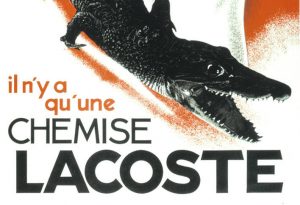
And I used Nadal as a great sample of a player being In the Zone for complete matches. Roger Federer was recently quoted as saying he was in the zone for several years in a row. (Wish I had of done that in my tennis career).
So what is In the Zone ?
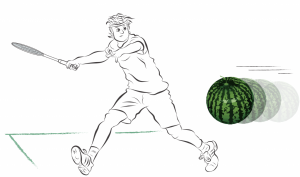
In the Zone is a state of mind in which the player has 100% concentration and focus on the task in hand.
Relatively the player will find that there is plenty of time to do everything. The ball appears to be travelling slower and to be larger. Hence I have sketched a slow moving watermelon ……..how could you possibly not hit that cleanly ?
So perhaps we had better make it clear that you the reader knows what is meant by the task in hand. To begin with it is an easy concept. Watch the ball and play your shot to the best of your ability. But those of you who have played many matches truly know how difficult it is to stay In the Zone for any length of time. Especially a full best of three sets match.
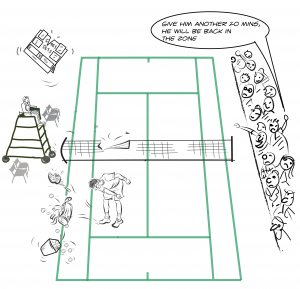
Two things happen. First your emotions can take control of you. After that the physical body will be affected and not allow you to perform correctly all the items which make up hitting a good shot.
In ball watching we need complete focus on the ball so that we can ascertain what is happening to the ball and what we expect the ball to do as it gets nearer to our planned point of contact (the skill of tracking the ball).
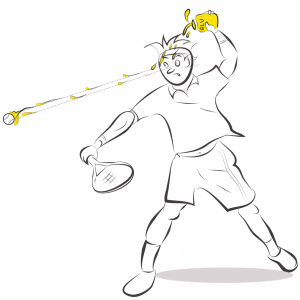
We need to know the speed of the ball, the spin of the ball, the height over the net (the elevation height of the flight path), so that we can be correct in estimating where we will need to go on the court to be in the correct position (spot) on the court. We need to know exactly where the ball will make contact with the court and all details for after the bounce leading up to the point of contact. (essentially where will the ball be when it is at waist height ?). And we will need to know how far we will have to move (distance) and in particular how much time it will take us to go from where we are now to the place for the point of contact. How do we do all that ?
Luckily it can be learnt quite easily….if you have the right attitude at practice. All you have to do is learn about these items….then repeat your attempts at practice over and over, and over and over, and over and over until it becomes habitual. Once good habits have been locked in you will repeat the correct set of movements every time in a tennis match UNLESS you allow your emotions to take control.
So if you get nervous or anxious your stomach will get butterflies or go into knots and your eyes will not be able to focus correctly on the ball. You will get the use of peripheral vision which cannot focus 100% on the ball, and will lead to the player not being able to calculate accurately all those important details mentioned above. The player will tend to freeze and run late.
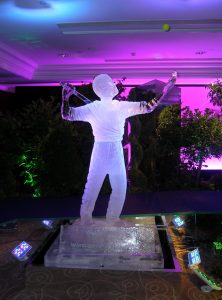
Other parts of the body will also be affected, leading to the physical body not being able to work in that lovely fluent free state which is shown so clearly by the superstar players. Look at how freely Roger Federer moves his body. And then of course there is your mind also being affected. Most commonly this shows in panic, confusion and the player making poor decisions.
How do you think your actual tennis performance would go under these conditions (loss of emotional control, loss of judgement etc) ? It really would be a miracle should you win a match under these conditions.
The graph below shows clearly that to play well you must not be at either extreme of your emotions. In other words you need to be In the Zone if you wish to perform at a high level.
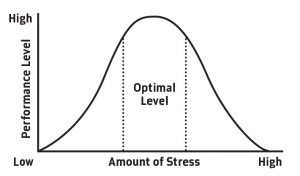
Why do we permit our emotions to take control ? Well it is a pretty much normal thing to do. We are humans, we have emotions ……..that is it in a nut shell. Now a professional player knows all of this and has worked hard on learning to control their emotions, however the poor club player is usually totally unaware of their behaviour and unfortunately does not realize that every match they play with uncontrolled emotions becomes more and more their habit. And under pressure with loss of emotional control this simply leads to……. Let’s go back to our old habits.
Habits !!!
Boy oh boy…. Is that a hot word.
Remember that as a beginner by the time you hit 100 balls you were already starting to form habits. If it is good habits…. wonderful. But if they are bad habits …..then you are in trouble.
You can develop bad technical habits simply because you have not played enough nor learnt enough. But for the tournament junior who has probably had hundreds of lessons …..there is no excuse. They should have worked on their weaknesses and developed only good habits with their technical movements. Unfortunately many kids do not and they add to the problem by practicing lazily and incorrectly. Many times at mid week practice sessions I hear from the kids “do not worry about the two bounces coach, on Saturday I will make it one bounce “. I know it does not work that way. And I see the kids not caring about how they hit the ball at practice. Do they not understand how habit can destroy them ? (Bad habits). These bad habits are the items which continually re-appear in tough match play where there is maximum pressure. If your emotional control is suspect you will almost certainly revert to old habits …..especially when the going gets tough. And some times cruelly, this type of reverting to old habits may happen only once or twice in a match …..but enough for you to lose the match. Always remember lightning strikes fast.

The following read/ puzzle is something for you to think about deeply.
Who / What am I ?
Half the things I do you might just as well turn over to me,
And I will be able to do them quickly and correctly.
I am easily managed; you must merely be firm with me.
Show me exactly how you want something done and after a
Few lessons I will do it automatically
Take me, train me, be firm with me, and I will place the
World at your feet.
Be easy with me and I will destroy you.
(The answer of course is ………HABIT )
Aiden goes on to take the lesson quickly
So after I had explained to Aiden that he would need to change his attitude in practice as well as match play, and that in each match he was to fight all the way through the match and that he needed to understand that Aiden 1 needs to be tossed out the window and Aiden 2 has to become the new Aiden, Aiden said “ok I can do it”. I warned him how difficult it would be …..he said he could handle it.
Now this whole conversation took about 45 minutes soon after his loss of his first match of the day. We had been able to find a quiet spot at the club.
An hour or so later he had to play his second match. I warned him that this match would be difficult because his opponent did not hit strongly but was a true warrior in match play. Never giving up and fighting to the end. So Aiden took Aiden 2 with him onto the court, played really well and won the match without losing a game. Almost the perfect match. What a turn around.
Aiden’s next match was against a slightly weaker player so Aiden won easily enough and played quite well. I warned him that it was always much easier to implement changes when the opponent is weaker, but against stronger opponents bringing in changes would be difficult and perhaps impossible to take place on the first day of the new programme.
His final match was against the number 1 seeded player. Aiden again took Aiden 2 on to the court with him, again played near perfectly …….. and won the match !! Amazing.
So after congratulating Aiden I told him that it was the first time I had seen a player fully embrace the new programme and implement the change from Aiden 1 to Aiden 2 …….all in one day !!
I have previously seen players successfully make the change, but never in one day. Often it takes the player 6 – 12 months of hard work before they learn to control their emotions and play the Perfect Match.
I think I should bring up another item for you to contemplate.
And that is the destructive nature of Distractions.
See below Image
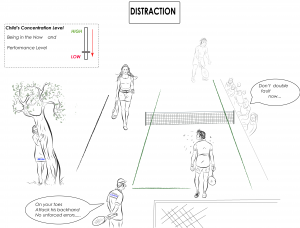
If a player is In the Now nothing will distract the player from concentrating correctly and having the body magically perform all those intricate body movements.
However I find that anytime a player is not In the Zone they are most probably easily distracted. Crowd movement, noises, photographers, their coach, their parents, music and even a baby crying can upset their equilibrium and before you know it (lightning strikes fast) the player has lost the momentum and probably the match.
So players, check yourselves to see if you are being distracted in your matches.
The sketch below shows Johnny being the only player not reacting to the Elephant. He will see the elephant with his peripheral vision, but he will not react to the Elephant. (Perhaps after the point is over ??)
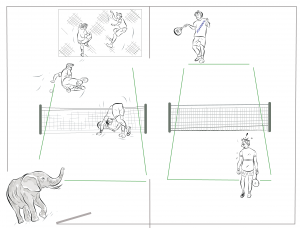
So for you readers having heard this story about Aiden ….are you thinking “if he can do it surely I can !!”. And “ I can break those old bad habits “.
All you need is to change your Attitude.
Congrats to Aiden for being able to quickly change personalities.
So good luck to you the reader, and good luck to Aiden with his tennis progress.
Alan Lane.

Recent Comments